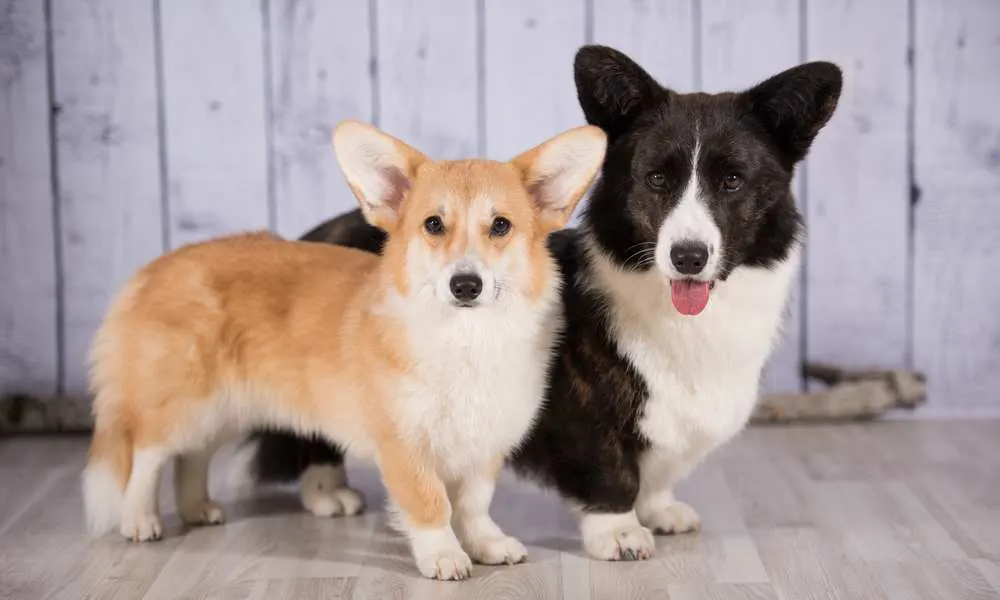Not familiar enough with your corgi? Say no more because with these 100 interesting facts you will know everything there is to know about your corgi pet. Read on!
Thanks to the power of the internet, you can get the information you want in a matter of seconds. For example, if you are a corgi owner, you would surely like to know something more about this breed.
If you’re looking for 100 important facts about corgis, that’s where we step in. We have got it all covered. In this article, you will read about every interesting fact there is about corgi dogs, so don’t miss a chance to find out something new!

Starting With The Basic Breeds
Okay, you are familiar with the fact that there are two basic types of corgi dogs: The Pembroke and The Cardigan Welsh corgi. When you look at them, they really look alike, but there are still some differences in height, weight, and color.
Let’s not forget: These two corgi breeds were characterized as one up to 1934 when the American Kennel Club finally decided to separate them rightfully.
There are a lot of exciting facts just concerning the breeds and their differences, so let’s take a look.

THE PEMBROKE WELSH CORGI
- Their beginning traces back to 1017 – According to one theory, this breed comes from a Swedish cattle down that was brought to Pembrokeshire by the Vikings during their invasion.
- The Pembroke Welsh corgi was used for herding purposes – When the Vikings introduced this breed for thousands of years, they were used as herding dogs. Back then, corgi dogs would carry cattle from the villages all the way to the markets.
- The Pembroke Welsh corgi was the favorite among the Royals – Once the corgi breed made its way to the British island, they were a hit with the royals. Soon, the Pembroke breed became a favorite pet of King George VI.
- Queen Elizabeth II owned more than 30 corgis – During her early years, Queen Elizabeth loved the corgi breed so much that she owned more than 30 of them. These dogs were fortunate, and they were very well treated also.
- In 1960, there were 9000 corgis registered – After the coronation of Queen Elizabeth II, people went crazy for corgis and by 1960, there were 9000 corgis all over Britain.
- Some Pembroke corgis can live up to 16 years of life – The corgi breed is known for their long life expectancy, and some of them can reach 15 or 16 years of life.
- Pembroke corgi ears are fox alike – The Pembroke corgi ears are tampered to a rounded point.
- Some Pembroke corgis don’t have a tail – The Pembroke Welsh corgi puppies can be born either with a very small or no tail at all. This is a very noticeable difference between the two breeds.
- The Pembroke Welsh corgi loves “frapping” – This breed is known for “frapping” – restlessly running in circles.
- The Mascot for Amazon – The editor-in-chief had a dog named Rufus, who after some time, became the mascot of Amazon. Today, thanks to the cuteness of this corgi, Amazon is a dog-friendly culture.
- The Pembroke Welsh corgi starred in a film – A film starring Dame Jullien Walter is about a corgi dog that gets lost and has to find its way back to the palace.
- The popularity of this breed jumped by 25% – Because of the Queen and her love towards this breed, at a certain point there was an astonishing jump in the purchase of this breed – 25% in one year. Crazy, right?
See Also: 99 Best Names For Corgis: How To Name A Corgi?

THE CARDIGAN WELSH CORGI
- The Cardigan Welsh Corgi is the oldest among the two breeds – According to history, the Cardigan breed goes back 3000 years. They were brought to England by the Celtic tribe.
- Cardigans were crossed with sheepdogs – The Cardigan breed was crossed with a sheepdog in order to improve its herding skills.
- Judges preferred the Cardigan Welsh corgi – When the first dog shows were held, the judges weren’t exactly keen on the corgi breed, but if they had to choose, they would go with the Cardigan breed.
- The first Cardigan Welsh corgi came to the USA in 1932 – After the corgi breed gained popularity, it moved overseas. The first Cardigan Welsh corgi was imported into the USA in 1932.
- The Cardigan breed can reach 18 years of life – If you were wondering about the two breeds’ life expectancy, the Cardigan breed wins. There were instances where the Cardigan corgi stayed with its owner for 18 years.
- Cardigans come in more colors – The Cardigan breed has a broader range of colors than the Pembroke. They can be red, brindle, sable, or even black.
- The Cardigan Welsh corgi comes in blue merle – This is a very rare combination of colors, and only the Cardigan breed can come in this exotic color.
Here’s one interesting fact to close the history of the two breeds:
- “The yard-long dog” – Many centuries ago, both the Cardigan and the Pembroke breed were referred to as “Ci Sawdlo” which translates into “yard-long dogs.”
- From £500 to £1500 ($700 to $2000) – The price of the Cardigan Welsh corgi varies. While some are ready to sell their puppies for £500 (~ $700), others won’t bargain under £1500 (~ $2000).

THE CORGI CATTLE DOG
- The Corgi Cattle Dog is a mixture of a Pembroke and an Australian Cattle Dog – This breed inherits short legs from the corgi breed and an athletic spirit from the Australian Cattle Dog.
- The Corgi Cattle Dogs are both higher and heavier than the regular corgi – The Corgi Cattle Dog can reach 20 inches in height and almost 40 lbs in weight.
- This breed’s history goes back to 1897 – Robert Kaleski worked on mixing this breed from 1897 to 1903 when the Kennel Club of South Wales finally accepted it.
- In 1890, this breed was officially accepted by the AKC – It took some time, but the American Kennel Club finally recognized this breed in 1980.
- Unlike the corgi breed, the Corgi Cattle Dog doesn’t shed that much – Corgi owners have a lot of trouble with their corgi shedding, but the Corgi Cattle dog sheds twice as less.
- The Corgi Cattle Dog has innate instincts – This breed is a perfect choice if you have a farm. Their herding instincts will do a great job, especially with the livestock.
- The Corgi Cattle Dog can be very stubborn – These dogs are known for their highly stubborn attitude, so you should make sure to provide them with a positive environment.
- These dogs eat twice as much as your corgi breed – Because the Corgi Cattle Dog is both bigger and heavier, it is not unusual that they will consume more food as well.
- These corgis rarely bark – This can be a relief for those who can’t get used to the regular corgi bark. The Corgi Cattle Dog will rarely bark.
- The Corgi Cattle Dog is not good with other pets – Because of their strong herding instincts and their need for responsibility, the Corgi Cattle Dog will not get along well if other dogs surround them.
- They are great candidates for special training – This is a very intelligent breed, and they are very quick learners. The Corgi Cattle Dog is an excellent candidate if you want to engage in some special training.

What About Corgi Puppies?
- Corgi puppies look like little husky dogs – When they are still small, corgi puppies resemble little huskies, and that’s what makes them even cuter.
- They eat a lot, even though they are small – If you’re thinking that you won’t need a lot of food – guess again. These puppies eat almost like their adult parents.
- It’s hard to tell what breed it is – Sometimes, it’s hard to tell if you’re looking at the Pembroke or Cardigan breed when they are just a couple of weeks old.
- Corgi puppies should be trained as soon as possible – Training can be demanding, so you better start while they are still tiny.
- They can be aggressive – Some cases show that puppies are sometimes more aggressive than the adult.
- Corgi puppies are great with little children – They make a great duo, it’s like having two babies.
- They can be hard to separate from their parents – When you’re adopting a corgi puppy, he might find it very hard at first because he was separated, so be patient.

Personality & Temperament
- Corgis are packed with personality – Although they are small-sized dogs, they are packed with personality traits, both good or bad.
- Corgis can be very bossy – These dogs like things to be their own way, and this can bring out their bossy side.
- You need to establish authority – Being bossy is one thing, but if you don’t show who’s the boss in the house, your corgi will take it for granted, and things can get ugly.
- Corgis love to cuddle – These dogs love to spend every minute of every day with their owner.
- They need a lot of exercises – If you want to keep your corgi fit and healthy, you need to take it out for at least two daily walks.
- Corgis are the adventurous type – These dogs will love to accompany you on your weekend hike. They can walk the walk.
- Your pet corgi will be very protective of you – Corgi dogs are very loyal, and you can expect them to look after you and protect you from any possible danger 24/7.
- Corgis can adapt to any environment – These dogs have traveled a lot during their life, so their adaptability level is extremely high. If you’re switching homes or moving somewhere for a certain period of time, you can count on this breed.
- Corgi females are more aggressive than males – It is true that these dogs can get aggressive at some point, but you might be surprised to find out that female corgis show aggression more frequently than males.
- They are very attentive – If you train your corgi the right way, they will attend to your every need and be your right hand.
- Corgis value their territory more than anything – Once they get their own spot in the house, they won’t be inviting any more quests.
- Corgis are great at being your emotional support – According to research, corgi dogs are excellent ESAs.
- They can be dangerous – If your corgi was on the loose for a long time, they could become dangerous.
- They are generally good-tempered – If you don’t step on their nerves, you will see that your corgi is actually very loving and good-tempered.
- Barking is part of the personality – If you own a corgi, you have probably heard a lot of barking. You will have to get used to this – they express themselves through their loud bark.
- The Cardigan is calmer than the Pembroke – If you compare the two, you will see that the Cardigan will be considered as more reserved.

Activity & Exercise
The corgi breed is high-energy, and if you own one, you should learn how to keep up with it.
- The corgi breed loves dog sporting events – This breed craves any kind of activity, and they love to be a part of any event that includes exercise and running around.
- You can bring your corgi camping – If you are planning a camping trip, you can bring your corgi with you and not worry about a thing. Their herding instincts can come in handy here.
- Corgis are very athletic – These dogs are very athletic despite their small legs.
- Some of the corgi’s favorite games are flyball, herding trials, and dock jumping – These dogs love sporting events and will gladly participate in every activity.
- Swimming is good for corgis, but don’t overdo it – Taking your corgi swimming is good for the development of their joints, but be careful not to overdo it. See Also: Why Do Corgis Float In Water?
- 1-2 hour daily exercise is essential for your corgi’s health – You should make time for 1-2 hour activity with your corgi on a daily basis.
- Corgis need to be mentally challenged as well – Besides keeping up with them physically, your corgi needs to be mentally challenged as well.
- Corgi exercises also include teaching them new tricks – You should teach your corgi new tricks from time to time.
- Your corgi can walk from 6 to 8 miles – If you are a fan of walking or hiking, you can bring your corgi with you. In moderate paste, they can walk anywhere from 6 to 8 miles.
- The most famous corgi activity is Tug Of War – Research has shown that corgis enjoy playing Tug Of War the most during their adult life.
- Smart toys are a great substitute if you don’t have time – If you’re on a tight schedule, you can buy your corgi smart dog toys and watch him stay captivated for hours.
- It will take a lot of time for your corgi to become exhausted – If you think that your corgi will tire out after an hour or so, you are mistaken. They have a great amount of stigma.

Health Issues & Solutions
Maybe your corgi doesn’t have the best health, but you can learn how to prevent some disorders and provide your pet with the best help with the help of these facts.
- Visiting the vet is a must, especially when they are young – Vet appointments are mandatory when your corgi is still a puppy.
- Corgi healthcare is expensive – Taking care of your corgi’s health is very financially demanding. You must have some money saved before you engage in this.
- You can apply for health insurance – Today, you can apply for insurance for your corgi puppy. This way, you will save lots of money on medicine and checkups.
- Do the DNA tests before it’s too late – This breed is susceptible to many diseases, and in order to prevent them from passing it on to future generations, go to the vet and do the DNA test.
- Obesity is a very common problem with corgis – Some owners like to overfeed their corgis and make them obese, but that is not what you should do.
- Corgi’s fur is susceptible to insects and ticks – Corgi’s fur is so thick that it attracts many ticks and insects during the winter seasons.
- Be aware of infections – Your corgi’s skin, especially their paws, are very delicate, and you must check them for infections.
- Corgi ears need a lot of attention – Those fluffy corgi ears need a lot of cleaning and brushing in order to stay clean and insect-free.
- Degenerative Myelopathy is very common for corgis – This is a disease that affects the neurological system and can lead to total paralysis.
- Check your corgi’s sight after he turns 1 – It is advisable to check your dog’s vision after they pass 12 months because it can weaken.
- Proper nutrition plays a big role in health – Feeding your corgi high-quality food can improve their immune system and overall health.
- Corgis can get kidney stones – It has been proved that corgis, just like humans, can get kidney stones. They are very painful and happen in their senior years.
- Weight loss or weight gain – The most common indicator that your corgi is sick is a sudden weight loss or weight gain. Pay attention.
- They have outbursts of anger – If something is really bothering your corgi, he will most likely have uncontrollable outbursts of anger.
- Joint problems are viewed in their refusal to play or jump – If your corgi has spent the entire day in the dog bed and refuses to get up or has trouble standing for too long, check in with the vet.
- Discuss grooming, nail trimming and obedience training – These are the 3 most important factors you should discuss with your vet.
- Don’t forget to vaccinate your corgi – Your corgi should not miss his vaccination appointments. This will protect him from diseases, pests and infections.
- If they need surgery, go with it – Thanks to the development of Veterinary Medicine, you can be safe knowing that if by any chance your corgi need surgery – he is in good hands.
- Dog wheelchairs for the disabled – For those corgis who have undergone major surgical procedures, but are still unable to walk, they will be assigned to dog wheelchairs.
- Too many treats can lead to diabetes – Be careful with awarding your corgi with treats because he might develop diabetes.

Food & Nourishment
As we said, nourishment plays a big role in your corgi’s health and overall life, so you should know some basic dog food facts:
- Corgis love to eat – These dogs are extreme food lovers and will munch on everything lay their eyes at.
- If you don’t have a meal plan, your corgi will become overweight – If you don’t measure your corgi’s daily food intake, he will be round as a ball in a couple of months.
- Apples are an excellent source of vitamin A – You should feed your corgi apples at least once a week.
- Avoid poorly cooked eggs and meat – If you fear the eggs or meat are undercooked, don’t feed them to your corgi. They will struggle to digest it.
- Treats should make up less than 10% of your dog’s daily diet – Don’t rely on treats as a meal; stick to concrete dog food.
- Corgis, like other dogs, are omnivores – If your dog isn’t in the mood for food right now, he might want to nibble on some plants.
- Carrots are great for your corgi – Carrots contain high fiber and protein levels – just what your energetic corgi needs.
- Never feed your corgi ice-cream – Sweets like this are extremely high in sugar for a dog, and your corgi might risk getting diabetes.
- Corgis love grain-free dog food – If you are not sure that type of dog food to buy for your corgi, look for grain-free products.
- Avoid feeding your corgi onion – Because of their content, onions are considered toxic for corgi dogs.
- Your corgi will love a home-cooked meal – If you have the time, why not cook some healthy home-cooked meal for your corgi? They will lick the bowl!
- Corgis will have trouble digesting dairy products – It would be best to keep those dairy-based foods far from your corgi if you don’t want stomach problems.
- Not all bones are great for your corgi – Although bones are considered a dog’s best friend, cooked bones should never be an option.
There you have it!
We have gone through the top 100 facts about corgis. Surely among these, you have come across those that made you get this dog in the first place.
However, there must be at least 1 you can add to this list!
LEARN MORE: Corgi Statistics – Corgi By The Numbers

